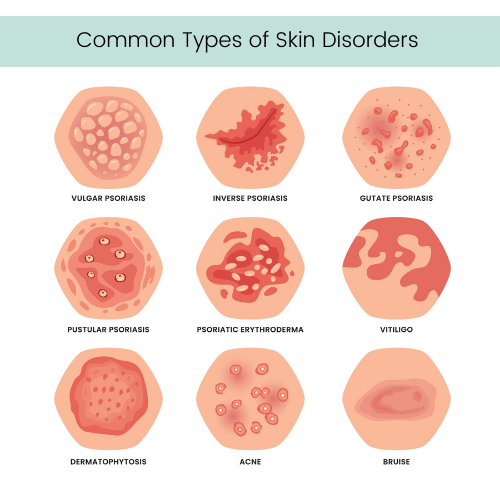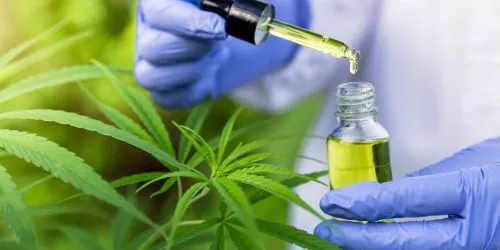
“Research indicates the anti-inflammatory properties of CBD may be useful for treating many skin conditions, including acne, eczema, and psoriasis. It could also maintain the skin in a positive naturally balanced state as the function of CBD and the ECS is homeostasis, which includes the skin.”
Dr Fatima Rashid
Cosmetic Scientist

Introduction to Skin Health and Its Importance
Skin health is essential because the skin is our body’s largest organ and acts as the first line of defense against environmental factors like UV radiation, pollutants, and harmful microorganisms. A healthy skin barrier helps retain moisture and keeps harmful substances out, preventing infections and irritations.
Additionally, good skin health can enhance our overall appearance, boosting self-confidence and mental well-being. Neglecting skin care can lead to conditions like acne, eczema, and premature aging. Taking care of your skin not only improves its appearance but also contributes to your overall health and quality of life.
Alarming statistics
- Sixty percent of people in the UK currently have a skin condition or have previously had a skin condition.
- 20% of all children have eczema.
- 70% of British people with skin conditions or scars say it affects their confidence.
- 53% of those with a skin issue feel judged by others due to their skin condition.
- By 2021, 14.6% of adolescents and young adults aged 10 to 24 were diagnosed with acne, marking a 7.4% increase since 1990.
Sources: “The British Skin Foundation" - https://www.britishskinfoundation.org.uk
MOST Common types of skin disorders include:
01
Acne:
Acne is a common skin condition that occurs when hair follicles become clogged with oil, dead skin cells, and sometimes bacteria. It primarily affects areas of the skin that have a lot of sebaceous (oil) glands, such as the face, chest, back, and shoulders. Acne typically appears as pimples, blackheads, whiteheads, cysts, and nodules. It is most common during adolescence due to hormonal changes, but it can affect people of all ages.
02
Eczma:
Eczema, also known as atopic dermatitis, is a chronic condition that causes the skin to become inflamed, itchy, red, and irritated. It can affect any part of the body, but it commonly appears on the face, hands, elbows, knees, and feet. Eczema is often seen in childhood but can develop at any age.
03
Psoriasis:
Psoriasis is a chronic autoimmune skin condition that causes the rapid build-up of skin cells, leading to thick, red, scaly patches on the skin's surface. These patches are often itchy, inflamed, and can sometimes be painful. Psoriasis is not contagious and tends to occur in cycles, with flare-ups followed by periods of remission.
04
Hives
Hives, also known as urticaria, are raised, red, itchy welts or bumps that appear on the skin. They can range in size and shape and may appear anywhere on the body. Hives are often caused by an allergic reaction, but they can also result from other factors like stress, infections, or environmental triggers.
?
Introduction to CBD and THE SKIN
Cannabidiol, or CBD, is a naturally occurring compound found in the hemp plant (Cannabis Sativa). Unlike tetrahydrocannabinol (THC), another compound found in cannabis plants, CBD does not produce a psychoactive effect, which means it does not cause a “high”.
CBD has been gaining popularity in recent years as a food supplement and ingredient in topical products such as creams and balms. In parallel to this, there has been a significant increase in medical research studies and clinic trials looking at the therapeutic effects of CBD.
How Does CBD work?
To understand this, it’s important to first have a basic understanding of the endocannabinoid system (ECS), which is a complex cell-signalling system found in the human body. The ECS is involved in regulating a variety of psychological and cognitive processes, including pain sensation, appetite, mood, and sleep. The primary role of the ECS is to maintain homeostasis (or balance) in the body systems and organs which include the skin.
CBD interacts with the body’s endocannabinoid system (and other systems) by positively affecting the cannabinoid receptors, primarily CB1 and CB2 receptors. It also interacts with other receptors.
CBD also works in other ways. Current research suggests CBD suppresses the breakdown of anandamide, a naturally occurring cannabinoid in the body that is responsible for activating the CB1 and CB2 receptors.
By doing this, CBD indirectly increases endocannabinoid levels within the body, suggesting it may enable them to continue supporting the function of the ECS, and contributing to the maintenance of a balanced and healthy internal state.
CBD (cannabidiol) works with the skin by interacting with the body’s endocannabinoid system (ECS), which plays a key role in regulating various skin functions like oil production, inflammation, and cell turnover. When applied topically, CBD binds to ECS receptors in the skin, helping to restore balance and reduce issues like redness, irritation, and excess oil. It also has natural anti-inflammatory and antioxidant properties, which can calm sensitive skin, soothe conditions like acne or eczema, and protect against environmental damage and signs of aging. Overall, CBD supports healthier and more balanced skin.
Some quick facts about CBD and Pain
- CBD is legal in the UK
- Regulated by the FSA
- It comes from industrial hemp not cannabis plants
- Oldest recorded medicine
- CBD is non-addictive
- CBD is relative safe (WHO report)


There are currently 34 different clinical trials of cbd (cannabidiol) being undertaken in Europe. Source: EU Clinical Trials Register
https://www.clinicaltrialsregister.eu
Research and Evidence on CBD for skin
Recent research has indicated the critical role of the ECS in maintaining skin homeostasis and barrier function, and ECS disfunction has been implicated in various skin disorders like atopic dermatitis, itch, acne, hair growth/loss, and hyper/hypopigmentation.
A research paper published in 2020 by Baswan Sm et al, stated “a body of preclinical evidence suggests topical application of CBD may be efficacious for some skin disorders, such as eczema, psoriasis, pruritis, and inflammatory conditions”.
A research paper published in the National Library of Medicine in 2019 (Palmieri B et al) concluded “the results showed that topical treatment with CBD-enriched ointment significantly improved the skin parameters, the symptoms and also the PASI index score. No irritant or allergic reactions were documented during the period treatment.” It also stated “The topical administration of CBD ointment, without any THC, is a safe and effective non-invasive alternative for improve the quality of life in patients with some skin disorders, especially on inflammatory background.”
Summary
While there are many treatments available for skin disorders which are widely used and can be effective, they also come with limitations and potential side effects and may not suit everyone. While the research on CBD and skin diosorders is limited, there does seem to be a consus on research undertaken at this point, that CBD can have thereputic benefits for many common skin conditions. While more research is needed, its seems likely that CBD will play a future role in skin treatment options for common skin disorders like acne, eczma and psoriasis
Dr Fatama Rashid
Latest Research and clinical trials on cbd and SLEEP
Therapeutic Potential of Cannabidiol (CBD) for Skin Health and Disorders
Baswan SM, Klosner AE, Glynn K, Rajgopal A, Malik K, Yim S, Stern N. -2020
A therapeutic effect of cbd-enriched ointment in inflammatory skin diseases and cutaneous scars
Palmieri B, Laurino C, Vadalà M. - 2019
















